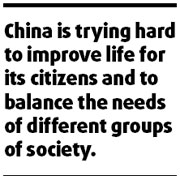For China too, seeing is believing
By Eberhard Kornotzki (China Daily)
Updated: 2008-04-25 07:27
Updated: 2008-04-25 07:27

Having been in contact with China on and off for over 20 years, I have witnessed the transformation and changes that have taken place here.
When I first arrived in 1986, the area at the Third Ring road in Beijing where my language school was located was still a village with pigs running around in the street.
There was an old lady who used to sell very greasy but delicious xianbing, Chinese fried pancakes, in front of our school entrance.
Color TV at that time was a rare luxury item and housing conditions were very poor. There were bicycles everywhere and I had a big "Yongjiu" bike which I liked to ride all across the city.
When I returned to Beijing again in 1992, Beijing had already changed much. There were a lot more cars, and the bicycle lanes had become much smaller. Today, the top shopping malls in Beijing are no different from the ones in the West in terms of quality.
For many people in China, living standards have improved significantly and faster than in other countries I know. Moreover, the government is taking effective measures to address environmental issues.
We see a growing middle class in China with strong purchasing power, and incentives to work hard to better one's lifestyle have become the driving force of economic growth.
I have been to a few ethnic minority regions in the Guangxi Zhuang autonomous region and Sichuan province. The culture and traditions there are well preserved.
I've also seen many churches and mosques in China, including the Yonghe Lama Temple in Beijing, and I did not feel that religious practice in these places was being obstructed in any way.

The minorities in China have more rights than the Han Chinese do. For example, there are no restrictions on the number of children they want to have, which is different from the case with the Han Chinese. People outside China aren't necessarily aware of these things.
The Western media reports about Tibetans' human rights created a negative image of China but these did not reflect the complexity of the issues or the many improvements in people's living conditions and the efforts made to improve them further.
The fact that the central government makes substantial contributions to the economy of Tibet does not get much coverage either.
One of the reasons for this might be that in the West, the media are also businesses that have to generate profits. Negative stories tend to generate more attention and sell better, and therefore there are more of those published.
Nevertheless, if someone were to see only the recent Tibet-centric coverage of China, he or she would form a very negative opinion about China, which clearly is unfair.
The Tibet issue is highly politicized and it is conceivable that China sees the idea of Tibet's autonomy as a threat to its territorial integrity, even though only "the middle way of genuine cultural and political autonomy" was proposed, instead of full independence.
However, how should such autonomy work in practice? People should of course be granted religious freedom but religious freedom also implies that their religion cannot be imposed on others. Demands for political changes made in the name of religion should be examined carefully for the same reason.
Western-style democracy isn't the only path to follow and for China perhaps not even the best one at this stage of its development.
For a country of such a huge population and socio-ethnic diversity, the tasks of maintaining political stability and social harmony are of paramount importance. These are difficult to accomplish, especially in the absence of a history and education in the democratic processes.
China is trying hard to improve life for its citizens and to balance the needs of different groups of society. Just to cope with the logistical challenges of providing food and shelter for 1.3 billion people while dealing with the transition from a planned economy to a market economy is not an easy job for any government.
I find it sad that some people use the publicity surrounding the Olympics in order to push their political agenda. The idea behind the Olympic is to get people closer and to overcome differences through sports. But the way the Tibet issue has been addressed in this context resulted in a major embarrassment for the host country of the upcoming Olympics.
Right now, there are people on both sides calling to boycott each other - some in the West call for a boycott of the Olympics, and some in China ask for Western products to be boycotted.
This may be understandable to some extent but the effects certainly cannot be healthy. A boycott closes doors and prevents communication, exactly the opposite of what should be done.
I believe more communication would be the best way to overcome the current challenges.
The Olympics is certainly a good opportunity for China to increase the world's awareness of its situation. There will be lots of people - not just politicians and businessmen but also many ordinary people from around the world - coming to China as tourists.
They will see with their own eyes what it's really like in China and hopefully walk away with a more balanced view. Travel broadens one's horizons - at least that's what I have experienced with my friends from back home.
The ones that work internationally and travel to many countries usually are more willing to look at different viewpoints, whereas those who do not venture out of their home towns all their lives tend to be more influenced by media reports.
It is part of the media's responsibility to disseminate knowledge among people so that they can form more balanced views of current topics and events.
The author is CEO of the Wealth Index Capital Group based in Beijing
(China Daily 04/25/2008 page9)
|
|
|
|